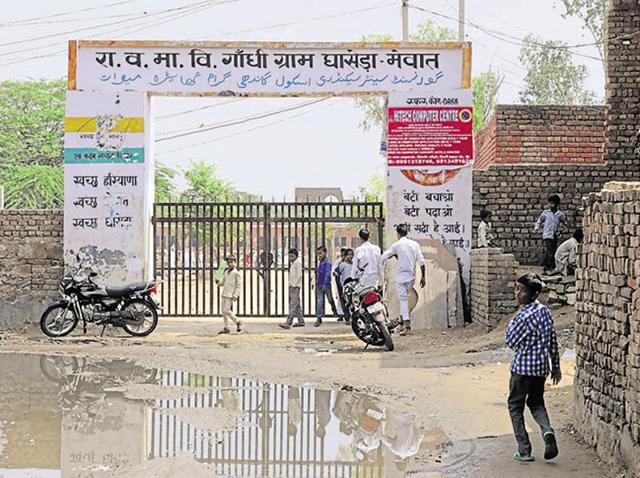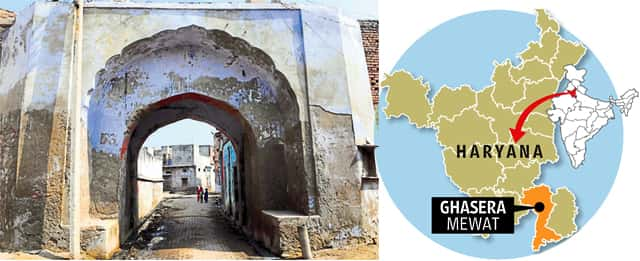Ghasera, where Mahatma Gandhi’s legacy lives on, waits for India
Ghasera’s inhabitants still live on the legacy of Mahatma Gandhi who visited at the time of Partition and convinced them not to migrate to Pakistan. And 69 years on, the villagers are still waiting for the ‘Gandhi fame’ to bring them good fortunes
Ghasera, 45 km southwest of Gurgaon, is no ordinary village, though governmental neglect is as evident as in any other region of Mewat—one of Haryana’s most backward districts.

For, the inhabitants here still live on the legacy of Mahatma Gandhi who visited at the time of Partition and convinced them not to migrate to Pakistan. And 69 years on, the villagers are still waiting for the ‘Gandhi fame’ to bring them good fortunes.
Gandhi comes calling
On December 19, 1947, Meo leader Chaudhary Yasin Khan, then a member of Punjab Legislative Assembly, was instrumental in inviting Gandhi to Ghasera, where Muslim Meo refugees from Alwar and Bharatpur in Rajasthan stayed at a camp on their way to Pakistan.
Apart from successfully urging half the refugees to stay back, all that the Mahatma’s visit brought for the village since then is a government school and its unofficial name — Gandhi Gram Ghasera. The village’s only school, Government Senior Secondary School, stands right in the field from where the Mahatma spoke.
“He addressed us using a microphone,” recalls 97-year-old Maulvi Ilyas of Jamalgarh in Punhana. “He urged us not to migrate to Pakistan, while promising a dignified life. But, nothing has changed in seven decades since.”
Utter neglect
A few metres towards the left of the main road ahead of Nuh, the district headquarters, the lane to Ghasera’s government school is filled with rainwater, though monsoons disappeared a fortnight ago. The old building has been reduced to rubble; classes are held under a tree.
“We are constructing a new building,” says village head Mohd Ashraf, 40. “Till then, students need to bear with us.”
Read | This Gandhi Jayanti, we follow trail of the Mahatma’s statues in Delhi NCR
A few miles from the school, villagers sitting on a cot and puffing hookah lament the lack of basic amenities. “We have no basic necessities like electricity and water,” says Noor Mohd. “Neither us not our children have job avenues.”
School-going children, who have grown up hearing about the village’s Mahatma connection, are not so excited. “Gandhiji’s visit has not led to any improvement in our life,” says Saad Khan of class 10.
Meos, India’s backbone
In his address to the refugees, Gandhi, according to scholars, had said his word was not so powerful as it used to be, perhaps regretting Partition. “If it had been so powerful, not a single Muslim should have found necessary to migrate to Pakistan from Indian Union and not a single Hindu or a Sikh to leave his home in Pakistan and seek asylum in Indian Union,” Gandhi was quoted by a newspaper.
Another report said Gandhi concluded by saying he had been told that Meos were like criminal tribes and, if this was correct, it called for self-reformation.
Eyewitnesses recall how Gandhi started his speech by urging Meos to stay back as “you are backbone of India”. Some say half of them stayed back after the address.

“I was 14 when Gandhiji visited us,” recalls Haji Isa Khan, 83, of Ghasera. “He started his speech by addressing Meos as the backbone of India. My uncle Natula Khan went to Pakistan; we obeyed Gandhiji.”
Academician Siddique Ahmad ‘Meo’, an author of eight books on Mewat, agrees with Khan. According to him, Congress leaders like Sardar Patel had been warned by Hindu Mahasabha leaders of the “dangers” of having a large Muslim population close to the national capital, but Gandhi was against it.
Even Congress leader Gopi Chand Bhargava, says Siddique Ahmad, “warned” Gandhi on the matter. “The Mahatma straightaway rebuked him.”
But, much like the rest of Mewat, people here are also irked over recent ‘biryani policing’ by Haryana’s Gau Rakshak Aayog, terming it an act of snatching the livelihood of the poor. “Selling beef biryani is out of question,” says Shabbir Ahmad, 55. “The government is making poor people jobless.”
Gandhi, 41 days after his visit to Ghasera, was assassinated—on January 30, 1948. It sowed uncertainty among those who chose to stay back in India. At this, Gandhi’s spiritual successor Vinoba Bhave kept pacifying the people, who eventually settled in this village till as late as 1958.
India, no regret
Spread over 8 sq km area on both sides of Delhi-Alwar road, Ghasera is home to 25,000 people, mostly Meo Muslims, in 3,800 households. People here are primarily agriculturists, cattle-gazers and vehicle mechanics. The village, which was once walled, is left with a just-renovated gate out of the four of Ghasera fort it once used to be. Among other things, the villagers await a park or a monument as a tribute to Gandhi.
The neglect notwithstanding, the villagers say they feel privileged to be in India than in Pakistan. “We are better off in India, the largest democracy. Being in Pakistan would mean no safety at all,” says Mushtaq Ahmad, 42, a primary-school teacher.
Get Current Updates on India News, Lok Sabha election 2024 live, Election 2024 along with Latest News and Top Headlines from India and around the world.




